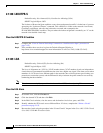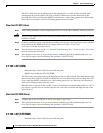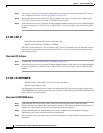
2-91
Cisco ONS 15310-CL and Cisco ONS 15310-MA Troubleshooting Guide, R7.0
Chapter 2 Alarm Troubleshooting
2.7.141 LOM
2.7.141 LOM
Default Severity: Critical (CR), Service-Affecting (SA) for STSMON and STSTRM; Major (MJ)
for VT-TERM
SONET Logical Objects: STSMON, STSTRM, VT-TERM
The Optical Transport Unit (OTU) Loss of Multiframe is a VCAT member alarm. (VCAT member
circuits are independent circuits that are concatenated from different time slots into a higher-rate signal.)
The alarm applies to OCN ports when the Multi Frame Alignment Signal (MFAS) overhead field is
errored for more than five frames and persists for more than 3 milliseconds.
Note Optical cards do not recognize the LOM. The system redirects the LOM alarm to the incoming side so
that any optical card can display this alarm as a TERM alarm.
Clear the LOM Alarm
To clear the alarm, log into the Technical Support Website at http://www.cisco.com/techsupport for more
information or call Cisco TAC (1-800-553-2447) in order to report a Service-Affecting (SA) problem.
2.7.142 LOP-P
Default Severity: Critical (CR), Service-Affecting (SA)
SONET Logical Objects: STSMON, STSTRM
A Loss of Pointer Path alarm indicates that the SONET path pointer in the overhead has been lost. LOP
occurs when valid H1/H2 pointer bytes are missing from the overhead. Receiving equipment monitors
the H1/H2 pointer bytes to locate the SONET payload. An LOP-P alarm occurs when eight, nine, or ten
consecutive frames do not have valid pointer values. The alarm clears when three consecutive valid
pointers are received.
The LOP-P alarm can occur when the received payload does not match the provisioned payload. The
alarm is caused by a circuit type mismatch on the concatenation facility. For example, if an STS-1 is sent
across a circuit provisioned for STS-3c, an LOP-P alarm occurs.
Clear the LOP-P Alarm
Step 1 In node view, click the Circuits tab and view the alarmed circuit.
Step 2 Verify the circuit size listed in the Size column. If the size is different from what is expected, such as an
STS3c instead of an STS1, this raises the alarm.
Step 3 If you have been monitoring the circuit with optical test equipment, a mismatch between the provisioned
circuit size and the size expected by the test set can cause this alarm. Ensure that the test set monitoring
is set up for the same size as the circuit provisioning.
For instructions to use the optical test set, consult the manufacturer.
Caution Always use the supplied electrostatic discharge wristband when working with a powered ONS 15310-CL
or ONS 15310-MA.


















